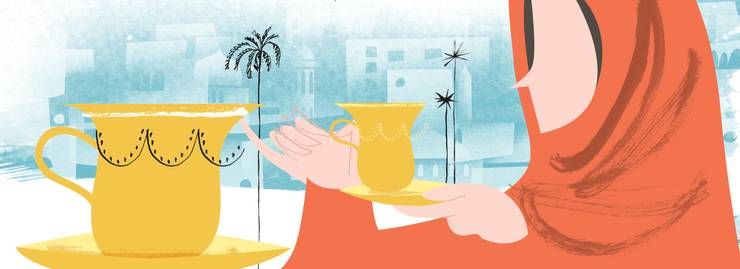Africa/Middle East / Global
Africa/Middle East
Briefing
The view from Gaza, a less than democratic election in Algeria and analysis on South Africa.

View from gaza
The new face of Hamas
By Daniella Peled
Sitting in front of a giant print of Jerusalem’s gold-domed Mosque of Omar, 23-year-old Isra al-Modallal is supposed to be the new, friendly face of the Hamas government – and she is meeting her brief. Over cups of sage-scented tea she earnestly describes her mission: “We need to show our sadness, that we are normal human beings, that we love and care.” The divorced mother of one, whose English still bears the northern England intonations of the years she spent in Bradford as a child, projects an image far from that of fierce Islamist fundamentalism. Dapper in her neat hijab and tightly belted trenchcoat, she’s a social-media whizz who uses WhatsApp to arrange departmental meetings and is constantly on Twitter. Al-Modallal’s appointment, harshly criticised by conservative elements, is part of efforts by Ihab al-Ghussein, the US-educated head of the government media office, to transform the regime’s PR strategy. It’s a sign of the troubled times in Hamas that some within the movement are trying to rebrand themselves away from the party of violent struggle – always a point of great pride – to one fighting for their human rights in the face of Israeli oppression.
“It is not easy to make a balance between being a resistance movement and a movement in government,” admits Ghazi Hamed, Hamas deputy foreign minister. “Until now, I can see we succeeded to some extent in order to adopt the resistance as a principle, as a right, and at the same time to continue to be in power.”
But Hamas is under pressure as never before. It has had a traumatic year, with its much-publicised rift with Iran over the Syrian civil war far from healed, its Turkish backers preoccupied with domestic affairs and the new emir of Qatar offering far less support than his father. Most damaging of all has been the changing of the guard in Cairo. The military regime that took power in Egypt last summer – bitterly opposed to Muslim Brotherhood-allied Hamas – closed the smuggling tunnels that served as a vital supply route for Gaza. Hamas says this is costing the Gaza economy $230m (€170m) a month. It means government employees have not received their full salaries for far too long and the electricity supply is down to eight hours a day. “People think twice before buying anything,” says a shopper in central Gaza’s scrappy market.
None of this is good news for Hamas, which seized power in Gaza in 2007 and once put great emphasis on its social-welfare programmes. Locals will tell you – quietly – that Hamas is now as corrupt as its much-maligned Fatah rivals. “They are very professional liars – they invent new taxes and are brutal about collecting them,” says a resident of a middle-class Gaza City neighbourhood, deriding levies such as the “shwarma tax”, whereby Hamas officials measure restaurant kebab columns to calculate revenue due per portion.
So Hamas is stuck in a precarious position. Reluctant to face another round of hostilities with Israel, it’s effectively acting as Jerusalem’s policeman by enforcing the 2012 ceasefire. Increasingly isolated internationally, it faces domestic dissent as well as a growing Salafist threat, especially in the south of the Strip. And amid all this, with its coffers depleted, the party of violent resistance needs to provide gas, electricity and water to an ungrateful public. “Circumstances in Gaza are very hard, very tough,” says Hamed, sighing. “You need a miracle in order to be strong here.”
Hamas’s lost allies:
- Egypt
The military regime accuses Hamas of interfering in Egyptian politics and has largely closed the vital Rafah crossing. - Syria
Hamas was forced to move its political bureau from Damascus after it refused to support president Bashar al-Assad against Syrian rebels. - Iran
Although high-level talks have resumed, relations between Tehran and Hamas are far from harmonious.
Election watch
Algeria
Andrew Mueller
April 2014
Type: Presidential
Date: 17 April
Candidates: Abdelaziz Bouteflika, president since 1999, will probably stand again. His rivals are Workers’ Party leader Louisa Hanoune and former prime minister Ali Benflis.
Issues: Algeria, though its institutions were surprisingly resistant to the Arab Spring, is bitterly fragmented as well as broke, chaotic and corrupt.
Monocle comment: It is time Bouteflika went. A country as oil-soaked as Algeria has no need to be poor; fresh perspectives are required, befitting a country in which 70 per cent of the population is under 30.
The Dispatch
South Africa x 3
Steve Bloomfield
April 2014
- Politics
The question isn’t whether Jacob Zuma will win next month’s election – it’s whether the African National Congress (anc), which he leads, will once again win more than 60 per cent of the vote. Criticism of the anc is at an all-time high but the opposition parties are yet to seriously threaten. - Economy
Mining remains a key part of South Africa’s economy but a series of tragic events in recent years have highlighted the industry’s problems. Expect reforms to be discussed during the election. - Diplomacy
Jacob Zuma’s one diplomatic victory is forcing his way into the Bric group. Elsewhere, South Africa’s strength in this area has rarely been utilised. With the continent’s crises stacking up further north, now would be a good time for SA’s diplomats to show leadership inside the AU.


